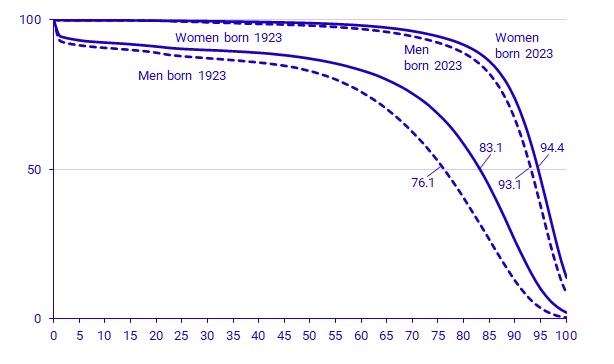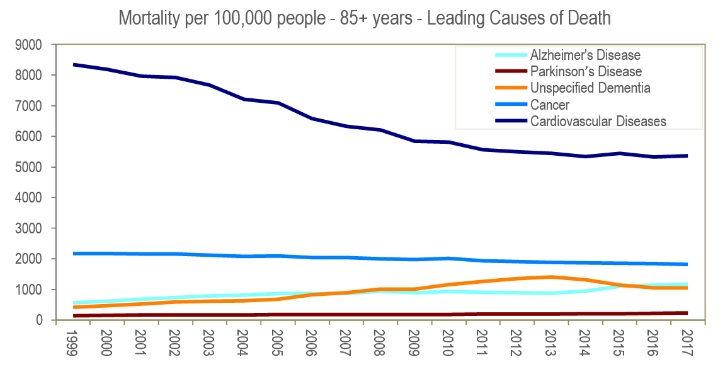Will Our Kids Live To Be 100?
I was at a dinner party recently and said, “I really think our kids are going to live to be 100” (they are all in their early 20s now). Someone asked, “Why?” and it got me asking myself why I am so bullish on longevity. Is it really going to happen in my kids’ lifetime, or am I just parroting the longevity hype machine?
First, let’s define this. I will say that I intended my statement to be that a high number of kids in first-world countries, something like 70-80 percent, would make it to 100. The world may change enough, positively or negatively, to affect this, but I’m talking about aging and longevity, not how things like global warming or war will impact us. Also, women outlive men, but I will use a blended number.
Maximum Age
Data suggests a reasonable maximum age, based on last century’s science, of about 115 years. Wikipedia lists the 100 verified oldest women; only 28% exceeded the 115-year threshold. For men, only 1 of the 100 made it beyond this number. Some might say 110 is a better number to use. Regardless, the challenge with living to 100 is making it to >85% of our theoretical maximum (100 is 87% of 115).
Current Estimates on How Many People Will Make It to 100
According to the internet, as of 2021, there were 89,739 centenarians in the US. Unfortunately, the number is not tracked by birth year. The closest I could find was based on 99-year-olds. In 2019, ~72,000 99-year-olds remained out of 2.95 million people born in the US in 1920. This comes out to 2.44% but does not account for immigration and other potential errors, so it is, at best, a ballpark figure.
In 2022, the Swedish government produced a lifespan projection, comparing people born in 1923 to those born in 2023. For people born now, they are estimating that ~20% will make the century mark. This is a healthy number, but not near what I suggested.
Comparing the two curves above, you can see that they are projecting most people born in Sweden today to live to be 90+, but not my original statement of 100. Why is this? This is because we are solving the issues that cause early deaths, causing the distribution shift to the upper right, but we are not significantly extending the ~115 aging limit I suggested earlier.
I don’t believe every person will live close to their theoretical maximum age; there is too much natural variation in the process, so we must push the maximum out.
What’s Keeping Us From Reaching 100?
The leading causes of death for people over 85 are:
- Cardiovascular Disease
- Cancer
- Mental Health Diseases (the family of diseases such as Alzheimer’s, Parkinson’s, and Dementia)
Dr. Peter Attia, a notable longevity expert, includes metabolic dysfunction in this list that he has dubbed “the four horsemen of chronic disease.”
How are we doing against these diseases?
We’ve made good progress against cardiovascular disease (CVD). The challenge is that, as we improve our survival rates against CVD and, to a lesser extent cancer, it’s opening us up to mental health diseases.
Solving these issues is going to take time and money, but I do believe we are going to solve them. We are learning the importance of managing chronic inflammation and metabolic health and discovering the mechanisms that cause these diseases to progress. It took 70+ years, but we now understand CVD. Cancer, with early detection, is becoming more and more survivable. We will do the same thing with neurogenerative diseases.
The Challenge with Longevity Solutions
The aging process is incredibly complex. Longevity researchers are learning the mechanisms of aging, but it’s a series of complex processes that affect our DNA, epigenome, cells, and biological systems. In addition, the solutions to these problems require biohacking millions of years of evolution.
Evolution is driven by reproduction. Let's compare two tribes from a million years ago. The one with an environmental advantage (e.g. more food) or a biological advantage (e.g. better at making tools) will have more offspring and, over time, become the dominant gene supplier to the combined population. For a tribe to flourish in this model, what is the optimum lifecycle? We are born, have kids, raise them to have kids, and then we pass on to unburden the tribe (remember Logan’s Run?). Depending on what we define as biological adulthood, this cycle takes 30–40 years. It is not coincidental that this is when most age-related diseases start progressing. For example (not a comprehensive list):
- Atherosclerosis, starts in 20s, visible by 30s, a leading cause of death after 40
- Sarcopenia, begins in the 30s
- Hypertension, the number of people quadruples after 40
- Osteoporosis, bone loss gradually begins around age 35
- Pituitary Gland, peaks in 20s and then declines
- Thymus begins degrading after age 40
- etc…
This is not to say we can’t all live to be 100, but we have to recognize that it’s not going to come from eating like our ancestors or acting like hunter/gathers. It will come from biohacking our bodies, overcoming our evolutionary programming, and combining lifestyle, supplementation, and technology to achieve this.
What’s on our Longevity Horizon?
“Longevity Escape Velocity” is the concept that we reach a point, through treatments and tech, that aging becomes optional (escape velocity is the speed required to break planetary orbit). Some aging gurus keep predicting this is close, but the science still seems a ways away.
We will continue to solve the issues that cause early death, like CVD; so many people will live to be 90+, but it's probably going to take a breakthrough that extends the maximum lifespan to make becoming a centenarian a routine thing. A few medications show promise (e.g. metformin, rapamycin), and there are exciting recent breakthroughs in epigenetics, but it’s way too early to claim any victories.
So, Will Our Kids Live To Be 100?
My initial assertion, 70–80% of our children becoming centenarians, was probably a little optimistic. Government projections are in the 20–30% range. With medical and technological advances, those numbers seem conservative, but until we extend humanity’s maximum age limit, we will be hard-pressed to hit the numbers I suggested.
That doesn’t mean it’s not a good goal, however.
Dave DuBois
November 24, 2023

